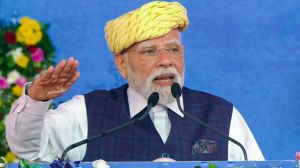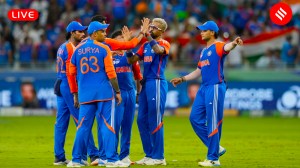‘‘People who are for reforms, for globalisation, also are deeply concerned about poverty, illiteracy”
• My guest today is one of the most familiar faces on your television screens. The self-styled poster boy of reform, isn’t it or m...

• My guest today is one of the most familiar faces on your television screens. The self-styled poster boy of reform, isn’t it or more than that?
Not self-styled.
• Jairam Ramesh.
Well, reforms seems to be under siege right now. People are saying that this vote is a vote against reforms. It’s certainly not a vote against reforms but certainly a strong protest in states like Andhra, in Tamil Nadu, in Haryana by farmers, predominantly, against the policies of the state government. Certainly.
• Maybe instead of self-styled, I should nuance it, you know at a time when most people are hiding away from being reformists, at least you are willing to say that.
No, I think this notion that reformers or poster boys of reforms don’t have a social conscience and there is only one section of the political spectrum that has a social conscience, a monopoly on social conscience, you know this is not right. People who are for reforms, people who are for globalisation, also are deeply concerned about poverty, deeply concerned about illiteracy, ignorance, malnutrition. It’s just that I think, as we are speaking here in…
• Teen Murti Bhawan
The Teen Murti which is the great man’s residence for 17 years. And you know Nehru was wedded to a mixed economy but the ingredients of that mix have to change and I am sure Jawaharlal Nehru himself would have changed with the times.
• But there will be people in your party who would now be accusing you and others of dismantling Nehruvian economics.
No. I think the great tragedy of India is that Gandhians ossified Gandhi and Nehruvites ossified Jawaharlal Nehru. Both Mahatma Gandhi and Jawaharlal Nehru were extraordinarily agile minds who would’ve changed with the times, seeing the new challenges that India faced. And, in many ways, you know Jawaharlal Nehru laid the foundations of the modern Indian nation-state (of) which we are all beneficiaries.
• Many of us are beneficiaries but so many of us Indians are also victims of that. Because we grew so slowly, and also you know these were such giants that the rest of us, people who followed, took that much longer to evolve, to change, to move on from there.
No question about it. I think, with the benefit of hindsight, some choices were made in the 50s and 60s that may look wrong but I do believe that in the 50s and 60s, the infrastructure for modern industry today, the infrastructure for the Infosys and the Wipros, the infrastructure for the Bajajs and the BHELs, the Marutis were laid in the 50s and 60s but we had to change, we had to change with the times, we had to cope with new challenges.
• You sound like the common minimum programme.
No I don’t. You really do require a public sector in some areas but you don’t need a public sector to run airlines, to run hotels, make bread, make soft drinks but you do require a smaller…
• Well, the bread and hotels are more or less finished but the airlines are still there…
The airlines are still there.
• Will this government have the courage to move in? Because the last one stopped just short. I think if they’d had another month, they would’ve taken fairly significant steps.
For many years, I have been advocating a venture capitalist role for the public sector. The public sector comes in, starts a project, gets it off the ground and you know, sells it off. The competitive advantage of the public sector is to start new projects. The competitive advantage of the private sector is to run them commercially. Take Delhi, for example. Private distribution of power, in my view, will, in the next two to three years, transform the power situation in Delhi.
• It has already made a…
It has already made a small improvement. I feel, for example, power distribution is clearly an area where the private sector must take on a larger role. But power generation is an area in which the public sector will continue to play an important role.
• But, there will be a lot of generation in private sector as well.
Undoubtedly, undoubtedly, but the NTPC would still continue to be important, some of the state electricity boards will continue to be important.
• But for a company like NTPC to be important, to be competitive, it will need to go to the market, raise resources.
I came to privatisation not out of any ideological conviction, let me say, I came to reform the public sector purely out of pragmatic reasons. Having worked in the government for 15-20 years, I became convinced in the early 90s that the political economy of the Indian state—the Indian neta and the Indian babu—will never allow the public sector the true managerial and commercial autonomy…
I came to the conclusion that public sector reform is very difficult in our context. And therefore, the only answer to reform is privatisation while keeping a small, selective, strategic public sector perhaps, in the oil industry, perhaps in areas like power generation.
• It is one thing for us to talk the reformist language like this. But look at the discourse of the first, say, 10 days of the election results. When we look back even five years hence, wouldn’t you wonder what went wrong? Populism happens before elections. In this case, populism started after elections, after a party had won. And you let the Left hijack the agenda. And then paint this election as a vote against reform.
Talking of the Left, there’s really no difference, in substance, between what Buddhadeb Bhattacharya is saying and doing and what Dr Manmohan Singh is saying and doing. There may be some differences of nuance, there maybe some difference of language, but really, Somnath Chatterjee, Buddhadeb Bhattacharya, I don’t see any difference between what they are saying.
Jyoti babu, for example, and what Dr Manmohan Singh and the others have been saying.
• I think one thing you have to say for the Left is: they have a policy, they have a world view. You can question it, you can disagree with it. But I am not saying they are being dishonest. My complaint is with the Congress party. That in the first 10 days after victory, they allowed the Left to create an impression that this was a vote against economic reform which, as you know, it wasn’t.
Yes and no in some ways. If you look at Andhra for example, I think it was a massive, massive upsurge of farmer anger against Chandrababu Naidu. If you look at Haryana, again, it’s a massive farmer upsurge against Chautala. Tamil Nadu, it’s a massive upsurge against Jayalalithaa.
• Andhra was a place (where) Chandrababu Naidu had been for nine years. He had begun to look urban, (the state had) three years of drought. You have to keep these things in perspective. Once you let someone run away with the ball, it becomes very difficult to retrieve it.
I wouldn’t paint this verdict as an anti-reforms verdict. But I would certainly say that this is a wake-up call for governments that are carried away by the reforms propaganda, by the hype of reforms. That there is need for balancing the economics of reforms and the politics of reforms. To go out and communicate to people what these reforms are all about. And ultimately start beginning to make a difference to people’s lives which was not happening in Andhra and Karnataka, for example.
• But if you balance the economics of reform and politics of reform, do you get the Hindu rate of growth?
No, I don’t think so. We have got out of the Hindu rate of growth. I think we are now in a five-and-a-half to six per cent minimum growth trajectory. Clearly, that is not sufficient. We have to grow at about seven to eight per cent year after year for the next 10-15 years. And I think it is possible with, on the one hand, liberalisation and globalisation and privatisation, not of the Arun Shourie variety, again, although he’s a good friend of mine and he’s a good friend of yours. I think he became overly aggressive, he became a jehad. He carried out a jehad against the public sector. I think you need to be a little more careful of what you want to privatise, how you want to privatise. And there’s no conflict between that and what the people are demanding, which is bijli, sadak, pani.
• But there’s been a degree of defensiveness in the Congress party on reform after the elections, which is the interesting part to me. Before elections, Congress was saying we were the originators of reform. You had advertising that said we were the ones who are responsible for India’s IT success, etc. Since election results, one stopped hearing those voices.
We are not going back to the licensing raj. We are not going back to the control raj which benefited only a privileged few.
• Actually, more than 60 per cent of sitting MPs got defeated. It just so happened that the NDA had more sitting MPs than you. But tell me, what is it you did, or your people did, say in January, February? What change did you spot in the air? Or did it happen by itself?
Right in first week of January, when we started planning for the strategy for this election, we recognised that this election is going to be an accretion of state-level verdicts. And that’s why the most important decision that Mrs Gandhi herself took was to effect a paradigm shift and go in for alliances. Alliance in Tamil Nadu, Andhra, Jharkhand, Bihar, Maharashtra. The one alliance that we tried for and did not succeed, of course, was the BSP in UP. In retrospect, that was good for us because now we are now able to stand on our own feet.
• But one set of people you did not align with and who actually you fought against are now your valued allies.
Who?
• The Left. See how politics changes.
That’s true. So alliance-building was first. Most important decision that was taken in January, let’s go for alliances. It’s a paradigm shift. The Congress doesn’t like alliances but now we recognise that we are in a coalition. So, that was the first decision. The second decision that, again, was taken by Mrs Gandhi, was to completely change her campaign style, the traditional fly-in-fly-out, public rally, rent-a-crowd, so to speak, and she started this Jan Sampark programme, which all of you guys never called Jan Sampark and insisted on calling roadshows. It was not a roadshow, it was really a Jan Sampark.
• Even I travelled on those roads a bit also and that takes me back to the question of what was this vote about. In fact, if you see people in UP, Bihar who are voting for Laloo and Mulayam, they are not revolting against any reform. Because they have not seen any reform. There have no roads, no hospitals. Doctors don’t come to work, teachers don’t come to work. Those are frozen states with frozen votes.
Indian elections are also not just about roads, they are also about getting your caste arithmetic, getting the, favourite word of politicians— samikaran— (right). Yeh samikaran sahi hai to hum election jeet jayenge.
• And sometimes, two plus two is five, sometimes three-and-a-half.
Tamil Nadu was a classic example of where the caste arithmetic, the allies arithmetic was right.
• So you got the better of Pramod Mahajan and his boys, is it?
(Laughs) I have a lot of respect for Pramod Mahajan and Arun Jaitley. And by the way, we were out-spent 1:10. They had war rooms, we had mini-rooms with no bathrooms, we were running a ramshackle operation out of 99 South Avenue, we had not many resources, we were a few people.
• Maybe, sometimes that becomes a problem. Too much resources. It makes you arrogant, complacent.
I think, ultimately, we had fire in our belly. They were complacent. We were the underdog. We didn’t expect to win. We wanted, our goal was, to get 135 or 140 seats and fight 2006.
• Well, you got about that, 145 but then the rest fell into place.
No, whatever we say, we may sound very wise now but none of us expected to form the government, none of us expected to be the single largest party, none of us expected to be the largest coalition.
• If we’ve got any lesson now, that you’ve learnt, we’ve learnt, and the BJP’s learnt, everybody’s learnt is that almost nobody gets re-elected now. And the real challenge would be if somebody gets re-elected after running a government.
Naveen Patnaik got re-elected.
• Well, those are exceptional cases. Laloo and Mulayam get re-elected.
No, no, but so does Naveen Patnaik. So personal image counts. He can’t speak Oriya, he’s a new politician.
• He does little for his state.
He does little for his state. But he gets re-elected because people see in him some embodiment of a hope. Maybe he will lose after 10 years. Maybe.
Photos



- 01
- 02
- 03
- 04
- 05




























